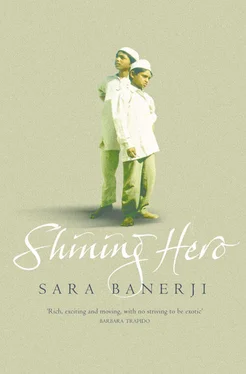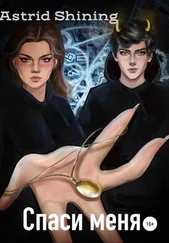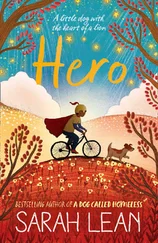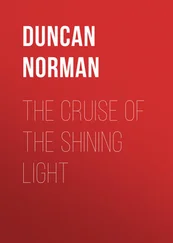Her mistress was waiting on the stairs, her expression thunderous. ‘You are incapable of even looking after that single child, let alone performing domestic duties at the same time. Every day there is some new reason for you to abandon your work,’ she shouted. ‘And today, when my husband came home there was no midday meal for him. Now he has returned to his office with an empty stomach and a great anger. Things have gone too far. I do not want you in my service. I will pay you what I owe and you must be out of that room by tonight, because I have another maid coming already.’ Dolly threw herself at the woman’s feet, wept, begged, promised, but it was no good.
‘You have made all these promises so many times already and you have never been able to keep them. It is the fault of that child. He is more trouble than three children put together and as long as you are burdened with him you will never find anyone to employ you.’ Baby Karna beamed and chuckled as though he was being complimented. Just having his mother holding him was all he ever wanted and if it meant that some woman shouted at them at the same time, what did it matter?
That night Dolly and Karna were back on the pavement again. In a way she felt relieved, for now, although they were poor once more, she could keep her child with her all the time. She became a rubbish-heap scavenger, specialising in flowers discarded from women’s hair or from thrown away garlands that had been used for honouring gods or guests. She would also find overblown blooms that gardeners had discarded, or flower arrangements that householders had considered past their prime. There were usually a few blooms that could be salvaged from any bunch or garland, no matter how wilted and damaged they at first might seem. Dolly would sort through her finds and roll the good ones into a moistened piece of cloth, to be taken home later and woven into new garlands, a little more bedraggled than the originals, but cheaper.
Dolly scavenged among men, women, children, pye dogs, crows, cows, all making a living out of the filth of the rubbish heaps. There were people who collected string, carefully garnering the lengths then rolling them into tidy balls. Others worked with old tins, others with pieces of cloth, others gathered the tinsel from garlands. There were people searching for tin, for plastic, for paper. And there were the really desperate who relied on the heaps for nourishment, fighting with the crows, dogs and rats to eat some rotten discarded end of a banana or samosa. There would be a sudden scramble because a green coconut shell had been unearthed with a little flesh still adhering or someone had come upon a thrown out bread loaf. The little desi cows seemed to be the only creatures to thrive upon the heaps. They were plump and had shining coats as though old newspapers, in which greasy food had been wrapped, provided a better diet than all the care and scientific feeding that Arjuna’s father gave to his pure-bred Jersey herd. Pandu’s Jerseys would never look as fit at the little cows of Cal. The cows were rented from their owners by people in the bustees, who fed and milked them and used their dung for fuel. They were let loose all day to forage on the rubbish heaps or among the shops where shopkeepers and passers-by would give them fruit or a sweetmeat. In the evening the animals returned to the bustee for hot bran and jaggery.
The rubbish heaps, breathing out powerful odours of rot and gas, were cleared away a couple of times a year. The raw rubbish was carted in lorries to the wet lands on the outskirts of the town and there dumped on damp land where it acted as a fertiliser for fields of vegetables. Among the hectares and hectares of still stinking debris grew the largest whitest cauliflowers, enormous aubergines, cabbages nearly two feet wide and the best ladies’ fingers in the whole of Bengal.
A new British Deputy Commissioner found one such stinking heap toppling near the High Commission and contacted the council, complaining of the health hazard, the smell and the flies and requested it be removed regularly, but was told there were insufficient funds. In the end he offered to pay for it himself, but this generous offer was greeted with fury by members of the ragpickers’ union. They marched in vast and tattered numbers round and round the residency shouting that they were about to be deprived of their living until he was forced to withdraw his offer and had to continue to live in the proximity of the heap. Sometimes these heaps would grow to ten, fifteen feet high then suddenly topple. Several ragpickers had been killed or badly injured by being buried under a collapsing heap of rubbish.
In the evening Dolly would bathe Karna ferociously under the ruptured pipe till she had rubbed away every trace of stink and rot. To Karna’s mother the sight of her frail son, shining with water in a muddy puddle, was the best sight of her whole day. When he was clean she would seat him on the ground and serve him whatever food she had managed to scrounge, for he was, after all, the man of the house. Sometimes she would manage to get enough fuel together to brew up a tiny fire on the pavement and cook her little man a hot meal of rice and lentils and on very good days even give him a spoonful of achaar to go with it. She always waited till Karna had finished before eating anything herself and as his appetite increased there would be very little left over for her. Often nothing.
When he was two she looked round and could not see him. She ran wildly up and down the road screaming and found him at last tugging at passing people’s clothes, patting his stomach and lisping, ‘No Mama, No Papa, very hungry,’ copying a bigger beggar girl called Laika.
Dolly was furious. ‘How dare you. We are not beggars. We still have our dignity.’ But the moment her back was turned he was down in the street again, and the money he gave her was welcome. She could not deny that. But there came a day when she could not find Karna anywhere. She went to all the places where he might be, till someone told her he had seen Karna being carried away by a foreign lady.
‘Which way did she go?’ asked the weeping Dolly. ‘Where did she take him?’
People pointed this way and that. Someone told her, ‘The kid was screaming.’ Dolly ran even faster and felt despair. She asked everyone she met, ‘Have you seen my little boy? He’s got golden eyes and a foreign lady has taken him.’ Dolly kept running madly and shouting, ‘Karna, Karna, Karna.’ The idea even came to her as she ran that, though she longed for her child so dreadfully, he would be better off with this foreign lady who would be able to give him good food, nice clothes and a proper education. But all the same she could not stop hunting for Karna. Perhaps when she found the lady, she might agree to let her take Karna away.
She ran, sobbing, all up Park Street and along Free School Street. She raced, panting heavily by now, along New Market Street. She rushed along Chowringee, banging into porters with merchandise on their heads, ignoring the outraged cries of shopping memsahibs, crashing into sahibs with briefcases.
She found him outside the Grand Hotel. The foreign lady was looking discouraged.
‘He told me he was an orphan,’ she said to Dolly. ‘Otherwise I would never have carried him away. I was only hoping to help him.’
Dolly was afraid, after that. ‘Don’t beg from foreigners till you’re older,’ she warned. ‘Stick to people from Bharat for now.’ He, of course, did not listen to her but was more careful now.
Dolly, worried at her son’s lack of education, began to teach him to decipher the words on the enormous cinema posters. The first words Karna learnt to read were the names of film stars and the titles of films. He began to watch out for new advertisements on his own and would come home, thrilled, to tell his mother he had managed to read ‘Prem Pujari’ or ‘Johnny Mera Nam’, all by himself. Concerned that his education was so one-sided she looked for other teaching tools. She encouraged him to recognise the letters on car number plates. She began to collect bits of newspaper off the rubbish heaps and instead of selling them on, wiped them clean of filth and grease and used them to teach Karna a wider range of reading. She even had a newspaper that she had kept from the good days and would bring it out on special occasions reading him the story of a man who had climbed the Himalayas without proper clothes and had survived because he was a yogi. ‘If you are a yogi you can do anything,’ Dolly told him. ‘Yogis can make themselves hot or cold by willpower, and make their tummies full without eating any food.’ Karna liked to read about Bollywood most of all. ‘I am going to be a film star and then I will turn you into a Maharani,’ he told his mother proudly.
Читать дальше











